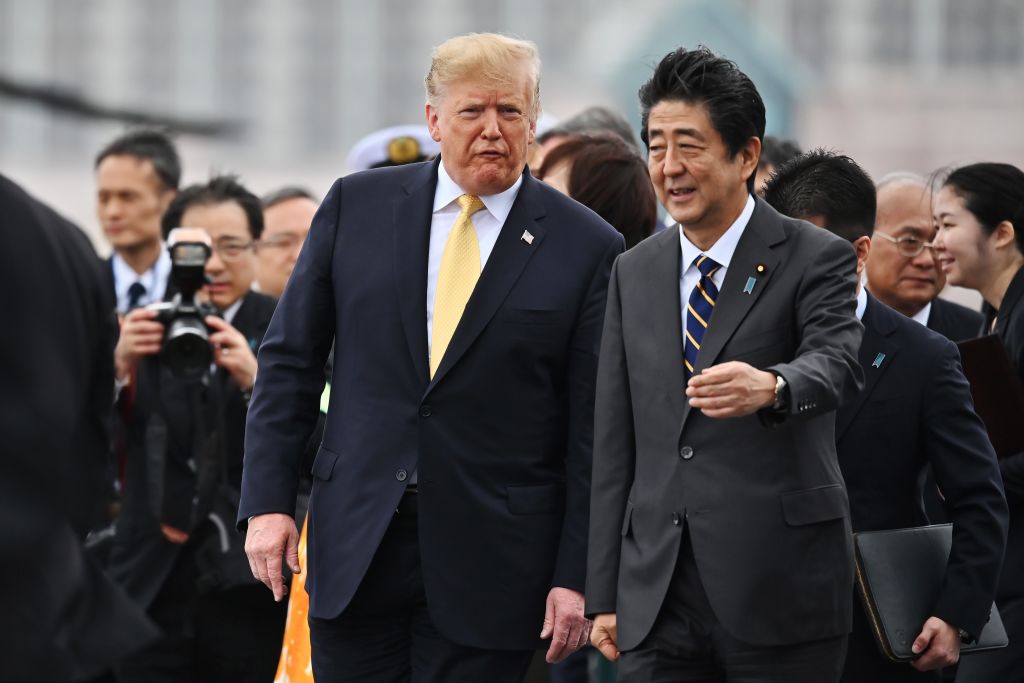Trump is reportedly musing about pulling the U.S. out of its foundational treaty with Japan


A free daily email with the biggest news stories of the day – and the best features from TheWeek.com
You are now subscribed
Your newsletter sign-up was successful
The U.S. military calls America's post–World War II treaty with Japan "the cornerstone of peace and security in the Pacific." President Trump has recently mused to confidants about withdrawing from the treaty, calling it too one-sided, Bloomberg reports, citing three people familiar with the matter. Specifically, Trump thinks it unfair the U.S. has to come to Japan's defense but Japan need not come to America's, and he has complained about Japan's efforts to move a large U.S. military base in Okinawa, telling confidants that "the land underneath the base is valuable for development" and "the real estate could be worth about $10 billion," Bloomberg reports.
Administration officials say it is unlikely Trump will actually pull the U.S. out of the treaty which forms the basis for the U.S.-Japan relationship, and it's unclear he has the authority to. "It's unsettled in American law whether the president can withdraw from a ratified treaty without congressional approval," Bloomberg says. "President George W. Bush withdrew from the Anti-Ballistic Missile Treaty in 2002 without lawmakers' consent." Trump has already withdrawn the U.S. from a number of international agreements, mostly those negotiated under his predecessor, President Barack Obama.
Trump is heading to Japan on Wednesday for a G-20 summit in Osaka, and while he will meet with Prime Minister Shinzo Abe, any disagreements they have would likely center around trade and tariffs, not treaties. Abe, who is hawkish and trying to build up the military Japan agreed to largely dismantle under the 1951 treaty, has a better relationship with Trump than most world leaders.
The Week
Escape your echo chamber. Get the facts behind the news, plus analysis from multiple perspectives.

Sign up for The Week's Free Newsletters
From our morning news briefing to a weekly Good News Newsletter, get the best of The Week delivered directly to your inbox.
From our morning news briefing to a weekly Good News Newsletter, get the best of The Week delivered directly to your inbox.
A free daily email with the biggest news stories of the day – and the best features from TheWeek.com
Peter has worked as a news and culture writer and editor at The Week since the site's launch in 2008. He covers politics, world affairs, religion and cultural currents. His journalism career began as a copy editor at a financial newswire and has included editorial positions at The New York Times Magazine, Facts on File, and Oregon State University.
-
 Local elections 2026: where are they and who is expected to win?
Local elections 2026: where are they and who is expected to win?The Explainer Labour is braced for heavy losses and U-turn on postponing some council elections hasn’t helped the party’s prospects
-
 6 of the world’s most accessible destinations
6 of the world’s most accessible destinationsThe Week Recommends Experience all of Berlin, Singapore and Sydney
-
 How the FCC’s ‘equal time’ rule works
How the FCC’s ‘equal time’ rule worksIn the Spotlight The law is at the heart of the Colbert-CBS conflict
-
 Witkoff and Kushner tackle Ukraine, Iran in Geneva
Witkoff and Kushner tackle Ukraine, Iran in GenevaSpeed Read Steve Witkoff and Jared Kushner held negotiations aimed at securing a nuclear deal with Iran and an end to Russia’s war in Ukraine
-
 Pentagon spokesperson forced out as DHS’s resigns
Pentagon spokesperson forced out as DHS’s resignsSpeed Read Senior military adviser Col. David Butler was fired by Pete Hegseth and Homeland Security spokesperson Tricia McLaughlin is resigning
-
 Judge orders Washington slavery exhibit restored
Judge orders Washington slavery exhibit restoredSpeed Read The Trump administration took down displays about slavery at the President’s House Site in Philadelphia
-
 Hyatt chair joins growing list of Epstein files losers
Hyatt chair joins growing list of Epstein files losersSpeed Read Thomas Pritzker stepped down as executive chair of the Hyatt Hotels Corporation over his ties with Jeffrey Epstein and Ghislaine Maxwell
-
 Judge blocks Hegseth from punishing Kelly over video
Judge blocks Hegseth from punishing Kelly over videoSpeed Read Defense Secretary Pete Hegseth pushed for the senator to be demoted over a video in which he reminds military officials they should refuse illegal orders
-
 Trump’s EPA kills legal basis for federal climate policy
Trump’s EPA kills legal basis for federal climate policySpeed Read The government’s authority to regulate several planet-warming pollutants has been repealed
-
 House votes to end Trump’s Canada tariffs
House votes to end Trump’s Canada tariffsSpeed Read Six Republicans joined with Democrats to repeal the president’s tariffs
-
 Bondi, Democrats clash over Epstein in hearing
Bondi, Democrats clash over Epstein in hearingSpeed Read Attorney General Pam Bondi ignored survivors of convicted sex offender Jeffrey Epstein and demanded that Democrats apologize to Trump
